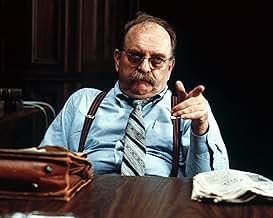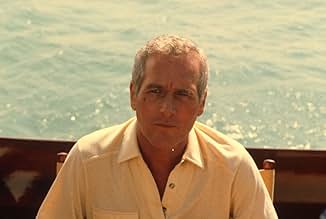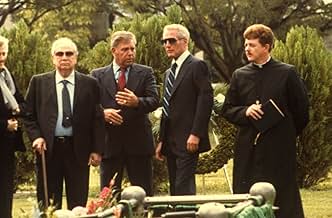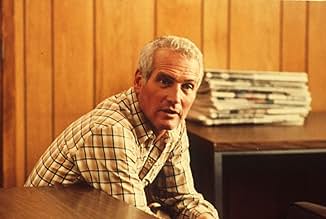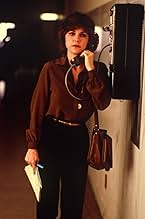AVALIAÇÃO DA IMDb
6,9/10
16 mil
SUA AVALIAÇÃO
Quando um promotor vaza uma história falsa de que o dono de uma loja de bebidas está envolvido no assassinato de um chefe de sindicato, a vida do homem começa a desmoronar.Quando um promotor vaza uma história falsa de que o dono de uma loja de bebidas está envolvido no assassinato de um chefe de sindicato, a vida do homem começa a desmoronar.Quando um promotor vaza uma história falsa de que o dono de uma loja de bebidas está envolvido no assassinato de um chefe de sindicato, a vida do homem começa a desmoronar.
- Direção
- Roteirista
- Artistas
- Indicado a 3 Oscars
- 3 vitórias e 8 indicações no total
Phanie Napoli
- Nickie
- (as Anna Marie Napoles)
William Kerwin
- Walker - Standard's Photographer
- (as Rooney Kerwin)
Avaliações em destaque
This movie looks to have all the elements of a classic but somehow falls short. Unscrupulous prosecutor dupes reporter Field into creating (false) impression that businessman Newman was involved in a murder, in the hope that will somehow help his investigation. The lie has unexpected and tragic consequences, after which Newman turns the tables. Field is fine as liberated yet vulnerable thirty-something, Newman is also good if a little obscure in a difficult role; but Brimley as Asst US Attorney steals the show when he finally blows the whistle on everyone. Brimley's short time in this movie really is classic and Oscar-quality. The overall problem here is a little too much soapbox and not enough real emotion from nearly everyone.
This movie provides a clever insight into the principles the press live by. Reporters sometimes lose their basic humanity because they're not looking at the human interest, but at covering all the angles. What's newsworthy is what's in the public domain as fact, not gossip. It's definitely something to think about in this age when large sections of the media are intent on muckraking over the affairs of those who are deemed to be 'high-profile'...
The movie asks us, though, to keep in mind that sometimes there's more going on than meets the eye, and that certain acts function as a means to an end. It can be seen as an extension of that great 70's movie tradition where acclaimed directors make polished films exposing high-level corruption. "Absence of Malice" is an involving exercise in paranoid mystery, with Newman in fine form as always, and Sally Field providing capable support.
The movie asks us, though, to keep in mind that sometimes there's more going on than meets the eye, and that certain acts function as a means to an end. It can be seen as an extension of that great 70's movie tradition where acclaimed directors make polished films exposing high-level corruption. "Absence of Malice" is an involving exercise in paranoid mystery, with Newman in fine form as always, and Sally Field providing capable support.
Paul Newman and Sally Field, though somewhat opposites both in their roles as Michael Colin Gallagher and Megan Carter respectively and in real Hollywood life, mesh and make believable lovers. Megan tells Michael that she is 30 something and doesn't need courting to play in the hay. Michael retorts, "Maybe I do," and drives away. Megan winds up somewhat of a failure both as a newspaper hound and as a liberated female. Then along comes Wilford Brimley in a bit part and runs away with the show. That's saying a lot since the well chosen cast gives it all they've got including ace jobs by Bob Balaban and Melinda Dillon.
The essence of the film is "What is the nature of truth?" What we read in the paper ain't necessarily so. Jibes are poked at bureaucrats too who certainly have problems determining what is truth. As long as the paperwork looks good then so goes the world. With the Horatio Alger success formula still around in the world of big government and big business, empire builders are a dime a dozen. Usually their asses are saved by cover ups and fall guys. In "Absence of Malice" the innocent victim outsmarts the bureaucrats and the Fourth Estate to bring the house of cards down, certainly an anomaly in the 21th century as it was in 1981, maybe even more so.
Admittedly, the film becomes too preachy at times which not only grates on the nerves but also slows the picture down. Yet the well-written script and Sydney Pollack's knowing direction keep it from becoming a total disaster. Not on the level of Pollack's previous "Three Days of the Condor" or his next feature "Tootsie," "Absence of Malice" still packs a wallop.
The essence of the film is "What is the nature of truth?" What we read in the paper ain't necessarily so. Jibes are poked at bureaucrats too who certainly have problems determining what is truth. As long as the paperwork looks good then so goes the world. With the Horatio Alger success formula still around in the world of big government and big business, empire builders are a dime a dozen. Usually their asses are saved by cover ups and fall guys. In "Absence of Malice" the innocent victim outsmarts the bureaucrats and the Fourth Estate to bring the house of cards down, certainly an anomaly in the 21th century as it was in 1981, maybe even more so.
Admittedly, the film becomes too preachy at times which not only grates on the nerves but also slows the picture down. Yet the well-written script and Sydney Pollack's knowing direction keep it from becoming a total disaster. Not on the level of Pollack's previous "Three Days of the Condor" or his next feature "Tootsie," "Absence of Malice" still packs a wallop.
To begin with, I had intended to include this in my tribute to director Pollack in June but somehow couldn’t trace the VHS I had it taped on; in the meantime, I acquired the film on DVD and, watched now as a valediction to recently-deceased star Paul Newman, it easily emerged as the most significant title of the lot. The picture itself had given new impetus to his career – though it would be overshadowed by his next effort, THE VERDICT (1982) – which had dwindled since the block-busting box-office performances of both THE STING (1973) and THE TOWERING INFERNO (1974).
An absorbing and uniformly well-acted blend of newspaper movie, political thriller, character study and romance (with the latter being the least successful i.e. most disposable and unconvincing element), the film deservedly earned Oscar nominations for Newman (his sixth – playing a longshoreman who starts being investigated about the murder of a rival simply because of his parental link to mobsters and the damage it causes to his integrity and daily existence), Melinda Dillon (as a friend of Newman’s who’s brought in to supply an alibi for him but which would expose the guilt in her own personal matters and which lead her to commit suicide!) and Kurt Luedtke’s fine, incisive script. Sally Field isn’t an actress I’m particularly fond of (for the record, I’ve watched neither of her two Oscar-winning performances in NORMA RAE [1979] and PLACES IN THE HEART [1984]: their directors, Martin Ritt and Robert Benton respectively, would coincidentally prove crucial to Newman himself!), though she’s perfectly cast here in a role encompassing resourcefulness, tenacity, awkwardness, tenderness and, finally, humility. She’s the star reporter who initially ‘leaks’ the news of the investigation on Newman thinking it as her duty, but doesn’t stop to ponder the consequences…as a result of which, her relationship with Newman proves a troubled one (in the film’s most intense sequence, he physically assaults her when she turns up before him after Dillon’s death!).
The title is a reference to a legal clause which basically states that newspapers are free to print anything they like, and that the people involved can do nothing against them because their reporting is accurate (even if it may not ultimately prove to be factual). The film’s climax – which plays like a dry-run for THE VERDICT itself and is highlighted by a scene-stealing turn from Wilford Brimley, it’s revealed how Newman has cleverly rebounded the affair on itself (so that it’s the reporters, the investigating committee and the D.A’s office who get their gooses cooked, as it were!). A nice surprise is Luther Adler’s appearance as Newman’s mobster uncle – and also worth mentioning is Dave Grusin’s fine score.
An absorbing and uniformly well-acted blend of newspaper movie, political thriller, character study and romance (with the latter being the least successful i.e. most disposable and unconvincing element), the film deservedly earned Oscar nominations for Newman (his sixth – playing a longshoreman who starts being investigated about the murder of a rival simply because of his parental link to mobsters and the damage it causes to his integrity and daily existence), Melinda Dillon (as a friend of Newman’s who’s brought in to supply an alibi for him but which would expose the guilt in her own personal matters and which lead her to commit suicide!) and Kurt Luedtke’s fine, incisive script. Sally Field isn’t an actress I’m particularly fond of (for the record, I’ve watched neither of her two Oscar-winning performances in NORMA RAE [1979] and PLACES IN THE HEART [1984]: their directors, Martin Ritt and Robert Benton respectively, would coincidentally prove crucial to Newman himself!), though she’s perfectly cast here in a role encompassing resourcefulness, tenacity, awkwardness, tenderness and, finally, humility. She’s the star reporter who initially ‘leaks’ the news of the investigation on Newman thinking it as her duty, but doesn’t stop to ponder the consequences…as a result of which, her relationship with Newman proves a troubled one (in the film’s most intense sequence, he physically assaults her when she turns up before him after Dillon’s death!).
The title is a reference to a legal clause which basically states that newspapers are free to print anything they like, and that the people involved can do nothing against them because their reporting is accurate (even if it may not ultimately prove to be factual). The film’s climax – which plays like a dry-run for THE VERDICT itself and is highlighted by a scene-stealing turn from Wilford Brimley, it’s revealed how Newman has cleverly rebounded the affair on itself (so that it’s the reporters, the investigating committee and the D.A’s office who get their gooses cooked, as it were!). A nice surprise is Luther Adler’s appearance as Newman’s mobster uncle – and also worth mentioning is Dave Grusin’s fine score.
Sydney Pollock directed this interesting drama starring Paul Newman as Miami Liquor salesman Mike Gallagher, who is the son of a mobster, though Mike himself is unconnected. When a Union Head is murdered, and mob involvement suspected, an overambitious Federal Attorney(played by Bob Balaban) decides to pressure Mike into helping them(even knowing his innocence) by going to irresponsible reporter Megan Carter(played by Sally Field) to publish the story. Mike has a solid alibi for the murder, but won't reveal it because it would hurt his fragile friend Teresa(played by Melinda Dillon) When the story(and her involvement) is published, it leads to tragic consequences, and Mike decides to teach the reporter and FBI a lesson by beating them at their own game...
Well acted and made drama makes good points about the media and personal responsibility. Almost goes wrong with misguided romance of Mike and Megan, but rights itself with memorable finale, with Wilford Brimley stealing the film in a fantastic supporting performance, laying down the law in amusing yet intelligent fashion.
Well acted and made drama makes good points about the media and personal responsibility. Almost goes wrong with misguided romance of Mike and Megan, but rights itself with memorable finale, with Wilford Brimley stealing the film in a fantastic supporting performance, laying down the law in amusing yet intelligent fashion.
Você sabia?
- CuriosidadesPaul Newman once said of this movie while publicizing O Veredicto (1982): "I'd rather have the freedom to do the kind of pictures like O Veredicto (1982) ... I enjoyed kicking the beejeezus out of the press in Ausência de Malícia (1981)."
- Erros de gravaçãoAfter spending his first night with Megan, Michael tells her as he is leaving that it is 5:30 a.m. It is clearly daylight outside. In Miami in mid-December, it would still be dark outside at that time.
- Citações
James J. Wells: You had a leak? You call what's goin' on around here a leak? Boy, the last time there was a leak like this, Noah built hisself a boat!
- ConexõesEdited into Absence of Satan (1985)
Principais escolhas
Faça login para avaliar e ver a lista de recomendações personalizadas
Detalhes
- Data de lançamento
- País de origem
- Idiomas
- Também conhecido como
- Ausencia de malicia
- Locações de filme
- Empresas de produção
- Consulte mais créditos da empresa na IMDbPro
Bilheteria
- Orçamento
- US$ 12.000.000 (estimativa)
- Faturamento bruto nos EUA e Canadá
- US$ 40.716.963
- Fim de semana de estreia nos EUA e Canadá
- US$ 97.667
- 22 de nov. de 1981
- Faturamento bruto mundial
- US$ 40.716.963
Contribua para esta página
Sugerir uma alteração ou adicionar conteúdo ausente


